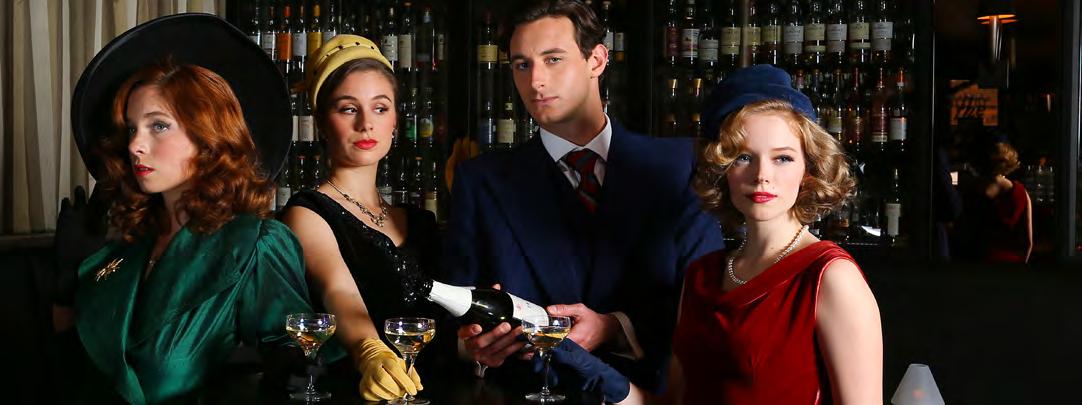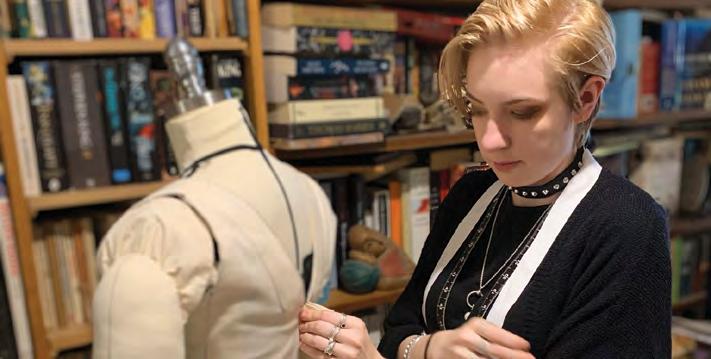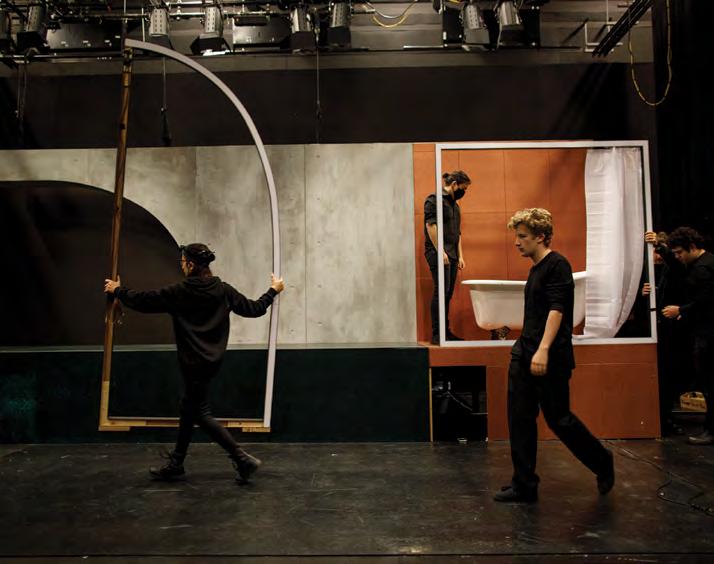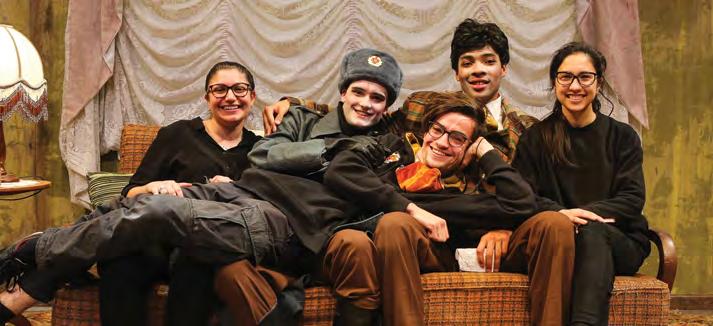
13 minute read
Higher Education
by NIDA
NIDA’s unique brand of education and training were transposed online for entire terms in 2020 to manage the restrictions of the COVID lockdowns.
With rapid innovation and considerable agility, we were able to maintain high levels of engagement across all courses – with students, with industry and with audiences – while prioritising the safety of our students and our community. A rapid reworking of NIDA’s approach to practice-led education enabled all operations to shift online for the entire second term and saw the midyear season of student productions staged digitally via Zoom, Twitch and YouTube. Staff and students maintained an impressive quality of work through these platforms before the easing of restrictions in July enabled a welcome return to face-to-face teaching for the second half of the year. Some of the highlights of industryaligned projects, collaborations, mentorships and opportunities in 2020’s Bachelor and Masters courses are outlined below.
Advertisement
ACTING The Acting centre incorporates Acting, Movement, Singing Actor and Voice training and delivers: → Bachelor of Fine Arts (Acting); and → Master of Fine Arts (Voice) degrees. The 2020 cohort benefited from a broadening of resources, reference points and texts through: → A new stream exploring contemporary and classic First
Nations texts – led by Guy Simon,
Russell Smith and Dalara Williams; → International perspectives from POC writers led by Angela Sullen; → Voice coaching with Liz Himmelstein, one of Hollywood’s leading voice coaches; and → support for students’ mental health through ‘de-roling’ techniques. Bachelor of Fine Arts (Acting) The BFA (Acting) course was restructured and reinforced for more integrated learning experiences and new supports for transition into industry. First year Acting training now includes: → A ‘History of Self’ project which invites students to explore and share cultural heritage; and → Intimacy training to equip them with the skills and techniques to manage personal boundaries and intimacy requirements in performance. Second-year Acting students deepened their practice-led learning through performances of: → Russian Projects, directed by
Clara Voda and Jeremy James, for rehearsal studio audiences; → A Comedy Project, directed by Alison
Bennett and Philip Quast; → American Song Book collaborations with John Bashford and Chris King; and → End-of-year productions (developed and delivered in workshop format due to COVID restrictions).
Third-year Acting students extended and further developed their practice through: → A streamlined American play project; → The ever-popular Articulate project; → A hugely successful collaboration with the writing team at Boomshaka on their graduation showreels (all made publicly available online).
Image, this page: The Master and Margarita (Photo: Lisa Maree Williams) Image, opposite page: triple j Unearthed music video shooting for Telescreen (Photo: Patrick Boland) Master of Fine Arts (Voice) While international placements were put on hold due to border closures, MFA Voice students continued to receive industry-aligned extensions of their training through: → Masterclasses with Frankie
Armstrong; and → Professional placements across the three seasons of productions – the Digital Theatre Festival, October
Season of Student Productions and the Festival of Emerging Artists. New end-of-study initiatives were introduced to support graduating students, including: → 1:1 mentor session with industry heavyweight Simon Burke; → A screen casting workshop delivered by Anoush Zarkesh; → Industry readiness masterclasses with Kip Williams (STC), Andrew
Henry (Red Line), Ann Robinson (Mullinars Casting Consultants),
Tasha Harrison (United
Management), Nikki Barrett (Barrett
Casting) and Lee Lewis (QTC). CREATIVE PRACTICES Creative Practices delivers: → Master of Fine Arts (Cultural
Leadership); → Master of Fine Arts (Directing); → Master of Fine Arts (Writing for
Performance); and → Common Subjects to all Masters and
Bachelor students.

Master of Fine Arts (Cultural Leadership) The MFA (Cultural Leadership) course brought together 20 first- and secondyear students across Australia with more than 30 expert guest speakers, in five intensive workshops, mainly delivered online.
International placements realised in the first quarter of 2020 – prior to the closure of international borders – included Cambodia Living Arts (Phnom Penh, Cambodia), Contemporary Arts Centre (Glasgow, UK), National Portrait Gallery (London, UK), Meow Wolf (Sante Fe, USA), South East Dance (Brighton, UK), Elaionas Refugee Camp (Athens, Greece), Talking Stick Festival (Vancouver, Canada), Codarts (Rotterdam, The Netherlands), The Momentary (Arkansas, USA), and ASSITEJ Arts Gathering (Kristiansand, Norway). Highlights in NIDA’s 2020 Cultural Leadership course included: → The appointment of the inaugural
First Nations Lecturer, Jacob
Boehme: an artist, curator, artistic director and teacher from Melbourne of Narangga and Kaurna (South
Australia) descent. His role will collaborate with students, lecturers and the MFA team to facilitate the integration of First Nations knowledge and practice in subject design, course materials and cultural leadership resources. → An invitation to curate a session at the Australian Academy of
Humanities 51st Symposium. The session, facilitated by Dr Suzanne
Osmond, with a presentation by
Dr Liza-Mare Syron (both from
NIDA’s Research and Scholarship
Committee), shared examples of practice-led research from Cultural
Leadership students Marilyn Miller,
Craig Middleton and Craig Rogers.
Master of Fine Arts (Directing) The MFA (Directing) culminated in the staging of eight 40-minute graduation productions, including one by guest alumni Director Samuel Lucas Allen, in the Festival of Emerging Artists 2020. The productions in NIDA’s venues were well received by audiences that included industry guests from a range of theatre companies. → Directing students worked closely with excellent industry mentors, including: Paige Rattray (Sydney
Theatre Company Associate
Director), Jessica Arthur (Sydney
Theatre Company Resident Director),
Sarah Goodes (Melbourne Theatre
Company Associate Artistic Director),
Gideon Obarzanek (Rising Festival [formerly Melbourne Festival]
Co-Artistic Director), Imara Savage (freelance director, formerly Sydney
Theatre Company Resident Director 2016–18), and Harriet Gillies (freelance director). Other highlights included: → A collaboration with Actors Centre
Australia on a Digital Scenework project which shifted a rehearsal room project online. Rehearsals and a work-in-progress showing were held over Zoom and on YouTube, before extending to in-person engagement in November. → The creation of music videos for rage and triple j social channels, based on concepts by Directing and Design students and involving pitches to ABC executives, concept refinements, an intensive shoot week, editing and colour grading. → Guest sessions on writing for the stage with Sydney Theatre Company
Literary Manager Polly Rowe. The sessions included case studies and hypothetical pitching sessions. → A new lo-fi cabaret project, Weimar
Kabarett, involving Directing, BFA
Design and Musical Theatre, Live
Production, Technical Services and Specialist Make-up students.
Devised over two weeks in July, the show was presented to a limited, socially distanced audience. → A two-day collaborative workshop covering Intercultural Practice and
Directing in an Asian Australian
Context with Contemporary Asian
Australian Performance directors and facilitated by internationally renowned director, Dr Ong Keng Sen from Singapore.
→ Collaborations with celebrated professional Directors on student productions; MFA students worked as Assistant Directors in the following teams: • MFA students Sophie Benassi and Zoe Hollyoak worked with Kate Gaul (Directing, 1996), Artistic Director of Siren Theatre Co; • Liam McIlwain worked with lauded theatre director Darren Yap (Directing, 1997); • Amelia Burke worked with actor and writer Darren Gilshenan (Acting, 1988); • Matthew Latham worked with award-winning director and NIDA Lecturer Priscilla Jackman (Directing, 2016); and • Ruby Rees and Mark Bolotin worked with opera director and NIDA Executive Director of Pathways and Partnerships Mark Gaal (Directing, 1984). A collaboration with NAISDA Dance College, originally due to occur in April 2020, was rescheduled for March 2021, still involving the 2020 Directing and Writing cohorts.
Master of Fine Arts (Writing for Performance) MFA (Writing for Performance) students adapted to digital delivery of classes and embraced a pivot towards screen, audio (including podcasts) and digital platforms. Highlights followed the easing of restrictions included: → End-of-year presentations; → A week-long film intensive familiarising students with camera and sound equipment; → A two-week television intensive; and → New opportunities including, for one graduate, full-time work with streaming giant Stan.
DESIGN PRACTICES Design Practices delivers: → Master of Fine Arts (Design for
Performance); → Bachelor of Fine Arts (Design for
Performance); → Bachelor of Fine Arts (Costume); → Bachelor of Fine Arts (Properties and Objects); and → Bachelor of Fine Arts (Scenic
Construction and Technologies).
Master of Fine Arts (Design for Performance) MFA (Design for Performance) courses maintained a strong focus on practiceled experiential learning in changing conditions by: → Shifting to the October Season of Student Production the design creation for productions of Orlando,
The Government Inspector, Ghosts and When the Rain Stops Falling (originally intended to be staged in June); → Set and costume design solutions for NIDA’s inaugural Digital Theatre
Festival, working with: • Sean Stewart (Primetime Emmy Award-winning storyteller, science fiction writer and Alternate Reality Game pioneer); • Deborah Pollard (Australia Council New Media Arts Fellow and former Artistic Director of Salamanca Theatre Company and Urban Theatre Projects); and • Pierce Wilcox (multi-media writer, Google Creative Lab collaborator, Artistic Director of Crack X, and opera librettist). → A styling project for an After Fellini photoshoot in 1950s cinema style in
Kings Cross with a group of Acting students led by Dr Julie Lynch and shot by Lisa Marie-Williams; and → For one graduating student, a paid internship on a Hollywood feature film at Fox Studios.
Bachelor of Fine Arts (Design for Performance) BFA (Design for Performance) first-year students were able to develop their learning in practice through: → Hypothetical set and costume designs for The Ham Funeral, led by designer Charles Davis; → Costume design with Dr Julie Lynch for A Flea in Her Ear; → Hypothetical set and costume designs for Scenes from an
Execution led by Stephen Curtis; and

→ A 3D costume/prop design project around the theme, ‘Ghost Stories’ in response to AGNSW’s Japan supernatural exhibition culminating in performances across NIDA. BFA (Design for Performance) second year students deepened their skills by: → Designing set and costumes for The
Winter’s Tale with Sport for Jove
Theatre company Artistic Director
Damien Ryan; → Designing hypothetical costume project for Volpone led by Adelaidebased designer Jonathon Oxlade; → Completing secondments on a film project for Pinchgut Opera in 2020, working closely with production designer Charlotte Mungomery (BFA
Design 2016, MFA Design 2018); → A design project for Into the Woods led by theatre, opera and film scenic designer Brian Thompson and supported by guest tutors Darren
Yap (Directing, 1997) and musical director and composer Max Lambert; and → Collaborating on the opera project Elektra led by STC
Resident Director Elizabeth
Gadsby (Design for Performance, 2013) with opera and music analysis guided by Tanja Binggeli. BFA (Design for Performance) third year students honed their craft by: → Designing and launching EXPONIDA 2020 to showcase the work of
NIDA’s graduating cohort; → Designing and launching the triple j
Unearthed music videos; → Taking on set and costume design roles within the Digital Theatre
Festival season with industry directors Nigel Jamieson, Deborah
Pollard and Leticia Cáceres; → Completing industry placements on screen projects Three Thousand
Years of Longing and AFTRS short film Threads; → Collaborating with MFA students in projects for the Festival of
Emerging Artists; and → Undertaking paid internships on a
Hollywood feature film project at
Fox Studios. Bachelor of Fine Arts (Costume) BFA (Costume) students had great outcomes in a disrupted year, including: → Offers of employment with their placement hosts – a Hollywood
Production at Fox Studios, forthcoming MGM feature film Three
Thousand Years of Longing, Sydney
Costume Workshop (Hamilton), the Australian Ballet and Goalpost
Pictures (Carmen); → Placements with Cosprop London,
Sydney Costume Workshop for Frozen, Dancing with the
Stars, Clickbait webseries, Bell
Shakespeare’s Hamlet, Bangarra
Dance Theatre and the Wakefield TV series; and → Continued strong employment outcomes for our graduates on large productions in film, musical theatre, ballet and opera. Bachelor of Fine Arts (Properties and Objects) BFA (Properties and Objects) first-year students found new ways to realise their creative vision by: → Working as props assistants and in crewing roles for NIDA’s Digital
Theatre Festival, an exciting and unique learning opportunity; → Finalising and displaying projects inspired by Japan supernatural and
Scenic Portraits; and → Working on the costume group project ‘Warrior’ and in furniture project for the October Season of
Student Productions. Second-year students were able to build their skills though: → Collaborating with MFA (Writing for Performance) students and various external collaborators in the realisation of their film project; and → Finalising and displaying their large sculpture project, furniture project, and puppet show Luc(k)y, which was performed live in the Atrium at NIDA. Third-year students honed their craft and developed industry-aligned experience by: → Working as Props Supervisors on the
Digital Theatre Festival; → Finalising practice-based research through their Masterwork projects; → Staging and live-streaming their
Masterwork project results to the
NIDA community, family and friends; → Working on the October Season of
Student Productions and EXPONIDA; and → Completing industry placements.
Two students did their industry placements in a Disney production at Fox Studios, another through Dan
Oliver Special Effects; one went to
Opera Australia, and another worked in MGM feature film Three Thousand
Years of Longing.
All 2020 Properties and Objects are currently employed by Disney productions at

Images, this page: Costume student Lily Mateljan working from home Image, opposite page: Acting students collaborating with Design for Performance students on a Vanity Fair style photoshoot
Fox Studios.
Bachelor of Fine Arts (Scenic Construction and Technologies) BFA (Scenic Construction and Technologies) students were able to build new worlds through industryrelevant projects including: → The creation of a joyful revolving
‘Sponge Bob Square Pants’ café at the conclusion of their foundation semester; → Scenic elements for The
Government Inspector, Next to
Normal and Orlando in the October
Season of Student Productions; → Mechanical and electronic design solutions with Terry Cummins; → Structural solutions for the Roslyn
Packer Theatre and the Capitol
Theatre; and → Collaborations with BFA (Design for Performance) students on
EXPONIDA and the Festival of
Emerging Artists.
TECHNOLOGY, PRODUCTION AND MANAGEMENT
Bachelor of Fine Arts (Technical Theatre and Stage Management) BFA (Technical Theatre and Stage Management) students were able to develop their skills in practice through: → A collaboration with Design for
Performance students in the annual
Video for Live Performance project; → Work with Major Partner Technical
Direction Company to create virtual staging; → Staging of the annual magic show, led by renowned magician Adam
Mada (Illusion and Magic Associate,
Harry Potter and the Cursed Child) and director Kim Hardwick; → Major research projects, with topics from ‘The Manipulation of Human
Emotional and Biological Reactions through Sound Frequencies and Musical Progression’ to ’Environmentally Sustainable Theatre
Production Practices’; and → Significant production support on
Cendrillon, a filmed opera produced by the Sydney Conservatorium of
Music as part of the MOU between the two organisations. NIDA’s Technical Theatre and Stage Management team were able to find new opportunities within the constraints of online delivery, including: → A broader suite of guests for classes, inviting international and interstate guests to engage directly with our students. These included: • Neil Kutner (ex–Head of Production of the Brooklyn Academy of Music); • David Grindle (Executive Director of the United States Institute for Theatre Technology); • Trudy Dalgleish and Gavan Swift (Australian lighting designers); and • Robert McKenzie (awardwinning film sound designer). → A series of podcast-style interviews – in part to reduce the screen time required of students – conducted by Mel Dyer (Head of Stage
Management), with leading stage management practitioners including
Josh Sherrin, Dani Ironside, Khym
Scott and Lillian U.











